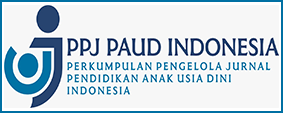AN ANALYSIS OF PROJECT BASED LEARNING METHOD IN INTERPERSONAL INTELLIGENCES OF PRESCHOOL CHILDREN
Abstract
This study aims to determine the effect of project-based learning methods on the development of the interpersonal intelligence of preschool children. Subjects in this study were preschool children especially 4-5 years old. The subject consisted of two kindergartens in Yogyakarta Indonesia, the participants consisted of 31 children. Thus, the data were used as a quasi-experimental research design. The experimental group was taught with a project-based learning method while in the control group with conventional methods. The data collection was an observation sheet. The research data obtained were analyzed using the t-test in the SPSS.16 program to see the differences between the experimental group and the control group. The results showed that there is a significant influence of project-based learning methods toward the interpersonal intelligence of preschool children. The recommendation was provided to parents, academics, practitioners in the discussion that especially emphasized addressing the need to increase opportunities for the interpersonal intelligence of preschool children in good stimulation.
Keywords
Full Text:
PDFReferences
Armstrong, T. (2009). Multiple intelligences in the classroom. America: present a variety of view points.
Bell, Stephanie. (2010). Project-Based Learning for the 21st Century: Skills for the Future. Routledge. The Clearing House, 83: 39–43, Copyright C_ Taylor & Francis Group, LLC ISSN: 0009-8655 print DOI: 10.1080/00098650903505415
Davis B. Gordon. (1985). Kerangka Dasar, Sistem Informasi Manajemen, Seri manajemen No. 90-A. PT Pustaka Binaman Pressindo.
File, et.al. (2012). Curriculum in early childhood education. New York: Routledge.
Gardner, H. (2013). Multiple intelligence: memaksimalkan potensi & kecerdasan individu dari masa kanak-kanak hingga dewasa (terjemahan Alexander Sindoro). Tanggerang Selatan: interaksara.
Gardner, H. (2016). Multiple intelligence go to school: educational implication of the theory of multiple intelligences. This content downloaded from 101.203.171.2 on Thu, 5 Apr 2018. UTCAll use subject to http://about.jstor.org/terms
Grant, Michael M. (2002). Getting a grip on project-based learning: Theory, cases and recommendations. Meridian: A Middle School Computer Technologies Journal a service of NC State University, Raleigh, NC Volume 5, Issue 1, ISSN 1097 9778 URL: http://www.ncsu.edu/meridian/win2002/514.
Green, Vanessa., Cillessen, Antonius H.N., Rechis, Ruth, Patterson, Meagan M. & Julie Milligan, Hughes. (2008). Social Problem Solving and Strategy Use in Young Children. The Journal of Genetic Psychology Research and Theory on Human Development Volume 169, 92-112. http://www.tandfonline.com/doi/pdf/10.3200/GNTP.169.1.92-112.
Harianti, Diah. (1994). Program Kegiatan Belajar Taman Kanak-Kanak. Jakarta: Departemen Pendidikan Budaya Direktorat Jenderal Pendidikan Tinggi.
Jackman, H.L. (2009). Early education curriculum: a child’s connection to the word internasional edition. United states: wadssworth cengage learning.
Julie E.M. & David F.T. (2003).Engineering education-is problem based or project-based learning the answer? Australasian J. of Engng. Educ., online publication 2003-04 http://www.aaee.com.au/journal/2003/mills_treagust03.pdf
Kanazawa, S. (2010). Evolutionary psychology and intelligence research [Electronic version]. American Psychologist, 65(4), 279-289. doi:10.1037/a0019378.
Kokotsaki, Dimintra., Menzies, Victoria, & Wiggins, Andi. (2016). Project-based learning: A review of the literature. Journals Sagepub, Vol. 19(3) 267 –277. doi/abs/10.1177/1365480216659733
Lunenburg, F.C. (2014). Applying multiple intelligences in the classroom: a fresh look at teaching writing. International journal of scholarly academic intellectual diversity vol. 16, No.1
Lwin, May, et al. (2008). How to multiply your child’s intelligence. Yogyakarta: Indeks
Maliah, N.A. (2015). Meningkatkan kecerdasan interpersonal melalui metode proyek pada anak kelompok B2 TK ABA Plus AL Firdaus Mancasan, Pandowoharjo, Sleman, Daerah Istimewa Yogyakarta. Artikel jurnal Skripsi, Universitas Negeri Yogyakarta. Yogyakarta.
Mitchell, et al. (2009). The negotiated project approach: project-based learning without leaving the standars behind. Early childhood educ J 36:339-346.doi 10.1007/s10643-008-0295-7
Moeslichatoen. (2004). Metode Pembelajaran di TK. Malang: Departemen Pendidikan dan Kebudayaan Direktorat Jenderal Pendidikan Tinggi Proyek Pendidikan Tenaga Akademik.
Noorlaila, Iva. (2010). Panduan lengkap mengajar PAUD. Yogyakarta: Pinus Book Publisher.
Perez, Maria del Mar Palenzuela & Ruz., Noemi Reina (2014). Interpersonal Intelligence and Motivation in Foreign Language Learning.
Safari, T. (2005). Interpersonal intelligence: metode pengembangan kecerdasan interpersonal anak. Yogyakarta: Amara Books.
Santrock, J.W. (2007). Perkembangan Anak Edisi sebelas jilid 1. (Terjemahan Mila Rachmawati & Anna Kuswanti).Jakarta : Erlangga. (edisi asli diterbitkan tahun 2007 oleh McGraw-Hill Companies Inc.)
Trianto, Ibnu BA. (2014). Mendesain model pembelajaran inovatif, progresif, dan kontekstual: konsep, landasan, dan implementasinya pada kurikulum 2013 (kurikulum tematik integrative/TKI). Jakarta: Prenadamedia group.
DOI: https://doi.org/10.36706/jtk.v7i2.12099
Refbacks
- There are currently no refbacks.
Copyright (c) 2020 Tumbuh Kembang: Kajian Teori dan Pembelajaran PAUD

This work is licensed under a Creative Commons Attribution-ShareAlike 4.0 International License.
Jurnal Tumbuh Kembang : Kajian Teori dan Pembelajaran PAUD
published by PG-PAUD FKIP, Universitas Sriwijaya, Palembang, Indonesia.
Jalan Srijaya Kampus FKIP KM 5,5, Palembang
Jalan Palembang-Prabumulih Km 32 Indralaya, Ogan Ilir.
email : jtk@fkip.unsri.ac.id dan mahyumi@fkip.unsri.ac.id
P-ISSN:2355-7443
E-ISSN: 2657-0785








